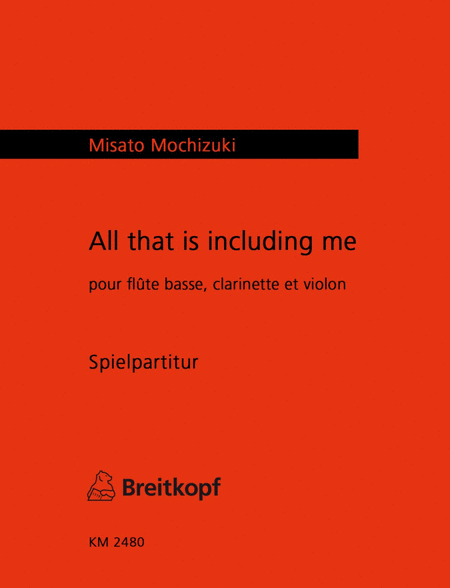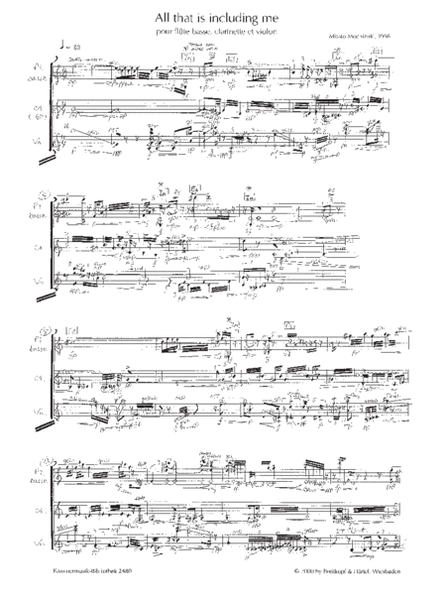All that is including me
-
Ships in 3 to 4 weeks
Details
- Genres
- Composers
- Publishers
- Formats
- Item Types
- Usages
Description
SKU: BR.KM-2480
Composed by Misato Mochizuki. Chamber music; stapled. Kammermusik-Bibliothek (Chamber Music Library). World premiere: Tokio, February 26, 1997. New music (post-2000). Performance score. Composed 1996. 12 pages. Duration 11'. Breitkopf and Haertel #KM 2480. Published by Breitkopf and Haertel (BR.KM-2480).ISBN 9790004502471. 10.5 x 14 inches.
The title is taken from an improvised poem by Buckminster Fuller:Environment to each must be All that is including me."Universe in turn must be "All that is including me."The incentive to write this piece came from reading the book Return from space by the Japanese journalist Takashi Tachibana. It is a collection of descriptions by some twenty American cosmonauts of their sojourn in space in the sixties. I was impressed by the spiritual power of the related experiences, and especially by the religious feeling. At the same time, the scientific literature on outer space also opened up a number perspectives: the idea of "complex rotation systems" for instance (such as with the Sun, Moon and Earth) which create specific variation processes, light/shadow effects, and thus make for cyclical time within which expansion and contraction alternate.The musical structure and function of the gagaku resembles such a complex rotation system. The key qualities here are:- repetition- binary time frame- a long metrical unit at the beginning and end of each phrase- a drumbeat at the end of each period- the entire rhythmical material is the outcome of the combinatorics of a few rhythmic cells which are simple and of varying duration- a phrase is the juxtaposition of expanded or compressed motifs, in which a cell or a motif can insert it-self.I was interested in combining these few fundamental rules with the principle of complex roation systems. The three instruments work autonomously around brief motifs: trills, third trills, glissando, held note, held note with change of timbre, silence. And every one of the instruments restricts or expands these motifs, depend-ing on their individual phase and speed.(Misato Mochizuki)Le titre provient d'un poeme improvise de Buckminster-Fuller:Environment to each must be""All that is excepting me"".Universe in turn must be""All that is including me"".J'ai eu envie d'ecrire cette piece apres la lecture du livre ""Retour d'espace"" du journaliste japonais Takashi Tachibana. C'est un recueil de recits d'une vingtaine de cosmonautes americains des annees soixante relatant leurs sejours dans l'espace. J'ai ete frappee par la force spirituelle de leur experience, en particulier par ce qui touche a la conscience religieuse. Parallelement, la litterature scientifique sur l'espace m'a fourni d'autres pistes: les systemes de ""rotation composee"" (le soleil, la lune et la terre en sont un), qui induisent des fluctuations specifiques, des effets d'ombre et de lumiere, et un temps circulaire ou alternent dilatation et contraction. Le fonctionnement musical du gagaku s'apparente a un jeu de rotation composee. Les caracteristiques principales sont les suivantes :- la repetition.- l'unite de temps binaire.- une valeur longue jouee au debut et a la fin de chaque phrase.- un coup de tambour a la fin de chaque periode.- l'ensemble du materiel rythmique provient des combinaisons de quelques cellules rythmiques simples, de durees differentes. - une phrase est la juxtaposition de motifs, dilates ou compresses, dans lesquels une cellule ou un motif peuvent s'inserer.Il m'a semble interessant de combiner ces quelques regles au principe des rotations composees. Les trois instruments travaillent independamment autour de courts motifs communs: trille, trille de tierce, glissando, note tenue, note tenue avec changement de son, silence. Ils les reduisent et les elargissent selon leurs periodes et vitesses propres.(Misato Mochizuki)CD: Eva Furrer (flute), Bernhard Zachhuber (clarinet), Sopie Schafleitner (violin) CD Kairos 0012402 KAI
World premiere: Tokyo, February 26, 1997".


 Share
Share